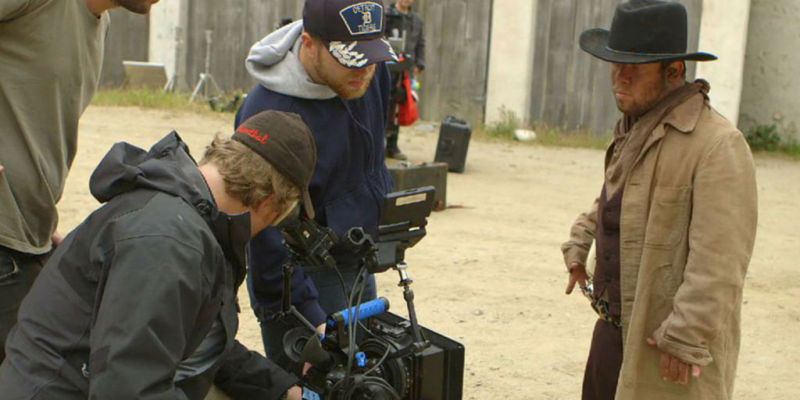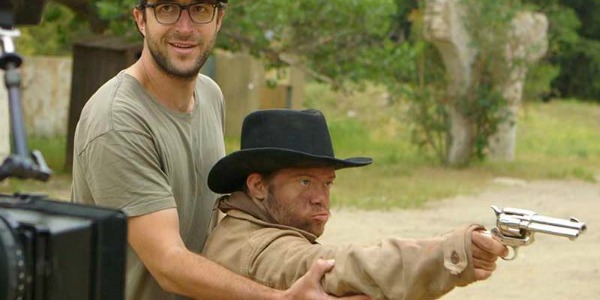BECOMING BULLETPROOF: Filmmaking As A Communal Convergence Of Differences

I got started watching avant-garde film at Oklahoma State University…
If you’ve ever wondered what inclusive cinema looks like, you should watch Becoming Bulletproof. Michael Barnett‘s documentary captures the filming of a Western, called “Bulletproof,” starring performers with different abilities. Among the cast are people who struggle with impediments to speech and mobility, and working with their different needs creates an unique atmosphere behind the scenes. “Bulletproof” is part of an annual filmmaking project, known as the Zeno Mountain Farm (ZMF), which was co-founded by brothers Peter and Will Halby, and their wives, Vanessa and Ila Halby.
Filmmakers at ZMF work with performers with different needs to produce a feature film every year. The goal of these films is not to educate the public about special needs actors: co-founder Will Halby describes it as a “social experiment in extreme diversity.” Unlike Michael Barnett‘s documentary, the movie within it (the western within the doc) is not meant to be educational for its audience or to convey any message about diversity; rather, the project itself is based on the bonds created in the process of making the movies.

The focus is not on the product in the way Hollywood understands that term. This isn’t to say that the product (the feature film) isn’t held to a high standard. Rather, the idea is that ZMF makes movies because of the value inherent to the process of filmmaking: expressing oneself creatively but also working diligently to achieve the desired result. The human relationships necessary to accomplish the project are valued, and Becoming Bulletproof makes it clear that the ZMF team understands these relationships to be the best quality of their art. In this sense, they are practicing filmmaking as a community forming institution.
The Cast
Becoming Bulletproof tells the larger story by detailing the personalities, talents, and different needs of several principle actors. Jeremy Vest has a rare genetic disorder known as Williams Syndrome, which causes some physical differences and cognitive difficulties. In Vest’s case, it also makes him an intensely kind and compassionate person. His love of the craft is shown in one memorable scene of his head in a plaster cast, for make-up purposes, which forced him to sit still for an extended time while it cured.

AJ Murray is a talented individual who explains how every day is a struggle with constant pain throughout his body. Murray provides some of the most intimate details about his life of any of the cast, including the frustration he feels being limited to explore new places and experiences. The relationship shown between Murray and the ZMF crew is loving; these crew members explain that they did not fully anticipate giving showers to those who needed their help, and their connection to Murray is palpable and moving.
Judi Moscariello plays Madame Muskrat in the film within the film, and her speech impediment is significant. Behind-the-scenes scenes with her are poignant and well-balanced. She laughs as much as you will cry.
Though I mention their medical conditions and different abilities, the movie does not focus too heavily on these details. Instead, Barnett details the personal lives of the cast who happen to have these conditions. The movie explores what it is like to make movies with people who have a truly diverse set of abilities.
Making Filmmaking Communities
The friendships that are created in the making of these films are something that doesn’t tally on a budget sheet, and thus it is hard to imagine a world where the logic of profit doesn’t ignore what ZMF is doing as an anomaly. In a weird way, this all makes me think of Michael Cimino‘s Heaven’s Gate, which was lambasted for its runaway budget that included six weeks to train the whole cast how to roller skate. The redeeming aspect of Cimino‘s film, that it forged a community of talented artists in collaboration, has been wholly lost on most popular film history, which tends to remember that film as the greatest box office failure of all time.

But what Cimino and Peter Lazarus, one of the ZMF filmmakers, have in common, is the interest in making movies in order to build communities: to make friends, have fun, and be creative. Though Cimino didn’t have the same ethos of inclusivity, it is at least worth noting that ZMF is not entirely anomalous in that there have been projects who invest in and foster human relationships in the process of making art.
Cinema And Difference
As an able-bodied, white male, I generally take for granted most of my day-to-day routine. After watching motivated individuals work through difficulties which I can only imagine, I feel like there are less things holding me back than I ever wanted to admit. I do not have any difficulty with mobility in my fingers, which allows me to freely express myself here.
I share this introspection only to illustrate that there is another value to truly diverse casting in movies; outside of Hollywood, the millions of people with special needs deserve to see that success is possible in any creative venture. And people with “normal” needs deserve to see people displaying their talents for who they are, regardless of medical conditions. The only thing standing in the way from this inclusivity are the impatient, efficiency-oriented studios and producers who do not consider cinema to be a tool for creating communities and, ultimately, changing the world.
One of the first functions of the cinema was to introduce viewers to different places, to transport them viscerally like never before into places that were wholly different from anything they could ever access. Transporting difference, bringing it to the attention of an audience, seems to me a basic function of the cinematic apparatus. So it is in the spirit of a travelogue that Becoming Bulletproof was an adventure into the unknown world of special needs actors. The film takes viewers through daily life with these actors and it becomes clear that their desires are just like any other actors’. The differences appear most readily, but the similarities are what really matter.
What do you think about actors with different abilities being included in movies? Can Hollywood ever be a progressive tool for naturalizing difference?
Becoming Bulletproof has arrived on digital download, VOD and DVD from Virgil Films on February 23, 2016.
Does content like this matter to you?
Become a Member and support film journalism. Unlock access to all of Film Inquiry`s great articles. Join a community of like-minded readers who are passionate about cinema - get access to our private members Network, give back to independent filmmakers, and more.
I got started watching avant-garde film at Oklahoma State University at an event called Exciterbulb. Through this I have been fortunate to view a decent number of rare avant-garde films, and accounting for these technological miracles is my main intellectual curiosity in life. I view and review movies of all sorts, and in general I never shy away from a pointless debate.













